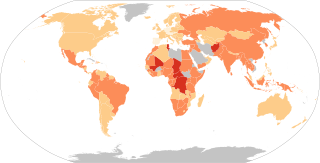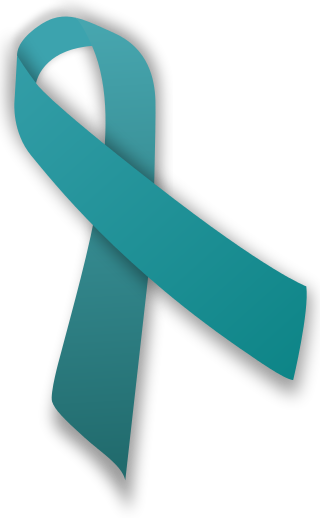Sexual assault is an act in which one intentionally sexually touches another person without that person's consent, or coerces or physically forces a person to engage in a sexual act against their will. It is a form of sexual violence that includes child sexual abuse, groping, rape, drug facilitated sexual assault, and the torture of the person in a sexual manner.
Some victims of rape or other sexual violence incidents are male. It is estimated that approximately one in six men experienced sexual abuse during childhood. Historically, rape was thought to be, and defined as, a crime committed solely against females. This belief is still held in some parts of the world, but rape of males is now commonly criminalized and has been subject to more discussion than in the past.
Sexual violence is any harmful or unwanted sexual act or attempt to obtain a sexual act by violence or coercion, act to traffic a person, regardless of the relationship to the victim. This includes forced engagement in sexual acts, attempted or completed acts and occurs without the consent of the victim. It occurs in times of peace and armed conflict situations, is widespread, and is considered to be one of the most traumatic, pervasive, and most common human rights violations.
Victim blaming occurs when the victim of a crime or any wrongful act is held entirely or partially at fault for the harm that befell them. There is historical and current prejudice against the victims of domestic violence and sex crimes, such as the greater tendency to blame victims of rape than victims of robbery if victims and perpetrators knew each other prior to the commission of the crime.
A rape kit or rape test kit is a package of items used by medical personnel for gathering and preserving physical evidence following an allegation of sexual assault. The evidence collected from the victim can aid the criminal rape investigation and the prosecution of a suspected assailant. DNA evidence can have tremendous utility for sexual assault investigations and prosecution by identifying offenders, revealing serial offenders through DNA matches across cases, and exonerating those who have been wrongly accused.

The Violence Against Women Act of 1994 (VAWA) is a United States federal law signed by President Bill Clinton on September 13, 1994. The Act provided $1.6 billion toward investigation and prosecution of violent crimes against women, imposed automatic and mandatory restitution on those convicted, and allowed civil redress when prosecutors chose to not prosecute cases. The Act also established the Office on Violence Against Women within the U.S. Department of Justice.
Rape is a type of sexual assault initiated by one or more persons against another person without that person's consent. The act may be carried out by physical force, under threat or manipulation, by impersonation, or with a person who is incapable of giving valid consent.
Rape can be categorized in different ways: for example, by reference to the situation in which it occurs, by the identity or characteristics of the victim, and by the identity or characteristics of the perpetrator. These categories are referred to as types of rape. The types described below are not mutually exclusive: a given rape can fit into multiple categories, by for example being both a prison rape and a gang rape, or both a custodial rape and the rape of a child.
Rape crisis centers in the United States, usually capitalized as Rape Crisis Center and often abbreviated as RCC, are community-based organizations affiliated with the anti-rape movement in the U.S. Rape crisis centers in other countries offer similar services, but have different histories and vary in their organizational structure.
Sexual abuse or sex abuse, also referred to as molestation, is abusive sexual behavior by one person upon another. It is often perpetrated using force or by taking advantage of another. Molestation often refers to an instance of sexual assault against a small child, whereas sexual abuse is a term used for a persistent pattern of sexual assaults.

Rape is a type of sexual assault involving sexual intercourse or other forms of sexual penetration carried out against a person without their consent. The act may be carried out by physical force, coercion, abuse of authority, or against a person who is incapable of giving valid consent, such as one who is unconscious, incapacitated, has an intellectual disability, or is below the legal age of consent. The term rape is sometimes used interchangeably with the term sexual assault.

The National Network to End Domestic Violence(NNEDV) is a 501(c)(3) not-for-profit organization founded in 1990, based in the District of Columbia. It is a network of state and territorial domestic violence coalitions, representing over 2,000 member organizations nationwide. The National Network to End Domestic Violence works to address the many aspects of domestic violence.
Intimate partner sexual violence (IPSV) deals with sexual violence within the context of domestic violence. Intimate partner sexual violence is defined by any unwanted sexual contact or activity by an intimate partner in order to control an individual through fear, threats, or violence. Women are the primary victims of this type of violence.
The anti-rape movement is a sociopolitical movement which is part of the movement seeking to combat violence against and the abuse of women.

The rate of sexual violence in South Africa is among the highest recorded in the world. Police statistics of reported rapes as a per capita figure has been dropping in recent years, although the reasons for the drop has not been analysed and it is not known how many rapes go unreported. More women are attacked than men, and children have also been targeted, partly owing to a myth that having sex with a virgin will cure a man of HIV/AIDS. Rape victims are at high risk of contracting HIV/AIDS owing to the high prevalence of the disease in South Africa. "Corrective rape" is also perpetrated against LGBT men and women.
Rape in the United States is defined by the United States Department of Justice as "Penetration, no matter how slight, of the vagina or anus with any body part or object, or oral penetration by a sex organ of another person, without the consent of the victim." While definitions and terminology of rape vary by jurisdiction in the United States, the FBI revised its definition to eliminate a requirement that the crime involve an element of force.

The National Sexual Violence Resource Center (NSVRC) is an American nonprofit organization that addresses the causes and impact of sexual violence through collaboration, prevention, and resources. Working in collaboration with state and territory sexual assault coalitions, representatives from underserved populations, the Centers for Disease Control and Prevention, the U.S. Department of Justice's Office on Violence Against Women, and a host of community-based and national allied projects, NSVRC provides national leadership to address and prevent sexual violence.
Sexual Assault Awareness Month (SAAM) is an annual campaign to raise public awareness about sexual assault and educate communities and individuals on how to prevent sexual violence in the United States. It is observed in April.
After a sexual assault or rape, victims are often subjected to scrutiny and, in some cases, mistreatment. Victims undergo medical examinations and are interviewed by police. If there is a criminal trial, victims suffer a loss of privacy, and their credibility may be challenged. Victims may also become the target of slut-shaming, abuse, social stigmatization, sexual slurs and cyberbullying. These factors, contributing to a rape culture, are among some of the reasons that may contribute up to 80% of all rapes going unreported in the U.S, according to a 2016 study done by the U.S. Department of Justice.

Sexual assault of LGBT people, also known as sexual and gender minorities (SGM), is a form of violence that occurs within the LGBT community. While sexual assault and other forms of interpersonal violence can occur in all forms of relationships, it is found that sexual minorities experience it at rates that are equal to or higher than their heterosexual counterparts. There is a lack of research on this specific problem for the LGBT population as a whole, but there does exist a substantial amount of research on college LGBT students who have experienced sexual assault and sexual harassment.






